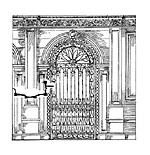
The Eucharist & Eulogies: Are They Connected?
GUEST COLUMN
Item One: We’re in year one of a three-year National Eucharistic Revival, the U.S. Catholic bishops’ multimillion-dollar response to the shocking news that only a quarter of American Catholics understand what we mean by “the Real Presence” of Christ in the Eucharist.
Item Two: A lot of Catholics felt there was “something lacking” in Pope Francis’s homily at Pope Benedict XVI’s funeral Mass this January. Critics say he didn’t speak enough about his predecessor, while defenders argue that the Church doesn’t do “eulogies.”
Could there be a connection between the Eucharist and eulogies?
Probably.
American Catholics are likely accustomed to tributes to the deceased during funerals, especially televised obsequies, a lot of which are Protestant in nature. And lots of those Protestant funeral sermons are really eulogies, paeans to the dearly departed.
So, what? you might be asking. And what’s this got to do with the Eucharist?
Second question first. Classical Protestant theology denied the value of prayer, or suffrages, for the dead. That position was hardly peripheral to its overall vision. It was a tenet that interlocked with a variety of fundamental Protestant principles. It was connected to the idea of sola fide, denying the value of good works. It was bound up with the rejection of indulgences, arguably the tinder for Martin Luther’s revolt. It tallied with the marginalizing, if not denial, of the notion of the Communion of Saints and its insistence on the sufficiency of Christ’s unique role in salvation.
You May Also Enjoy
The rubrics, gestures, and symbols that are employed serve a fundamental and very useful purpose: they reveal and give witness to the faith we profess.
What could be more Bible-based than the Mass, already saturated with Scripture, following a liturgical year of readings that corresponds to the life of Jesus?
What measures should be taken to fast-forward the reform of the reform; to stop the nonsense and increase the sense of the sacred at Mass?

